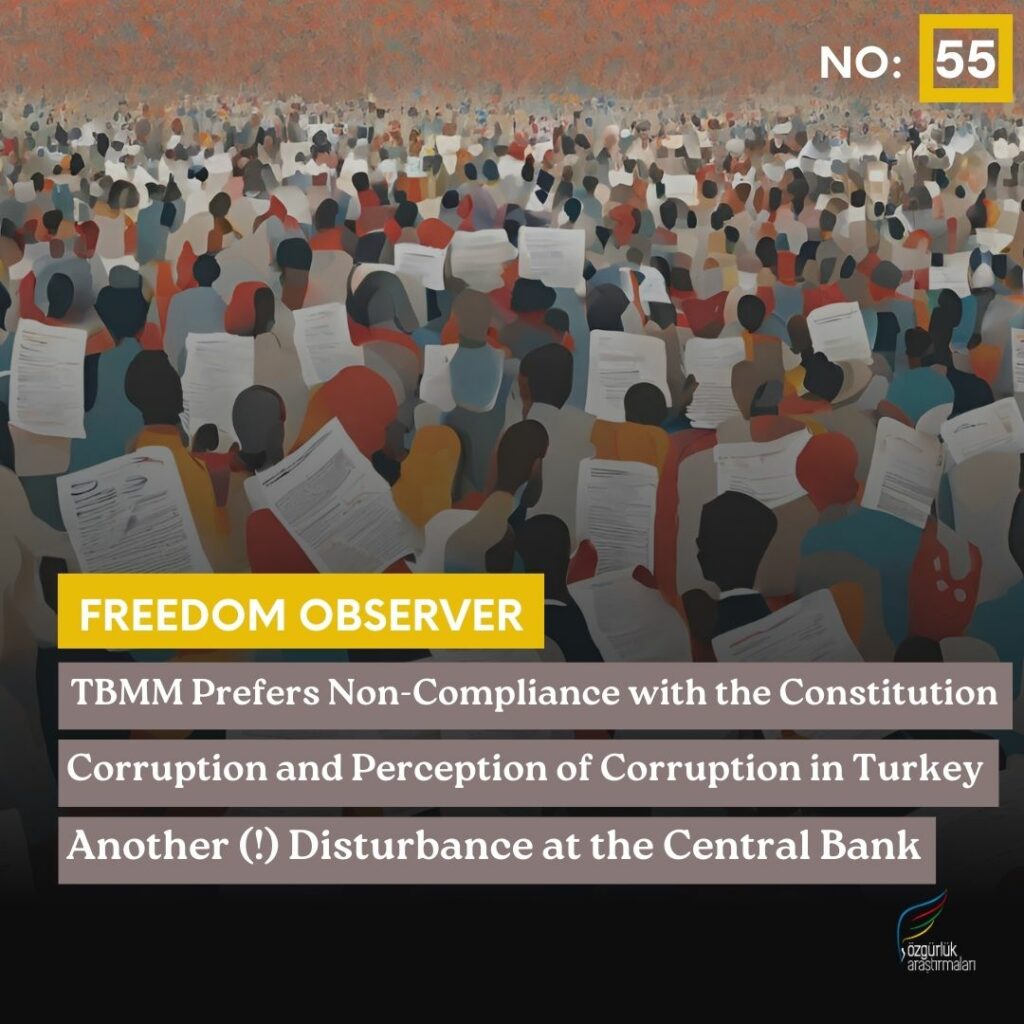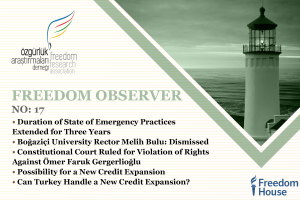
From Editor – in- Chef
One unfortunate event in the country in the last two weeks was the dismissal of Hatay deputy Ş. Can Atalay. At the meeting of the Turkish Grand National Assembly on January 30, it appears that Atalay’s deputyship was formally revoked with the reading of the allegedly finalized conviction decision in the general assembly. Apart from being unlawful and against the Constitution, this arbitrary action, which is politically unwise, will be elaborated upon in detail in the following article by our colleague A. Rıza Çoban. Let us say this much here: this unfortunate incident once again confirms the presence of a political body at the highest level of power in our country, which does not hesitate to sacrifice constitutional institutions such as the judiciary and the legislature, as well as the Constitution itself, to its political ambitions.
Another unfortunate event we experienced in recent days is that our country was subjected to two separate terrorist attacks within a short period. First, on January 28, during Sunday mass at the Santa Maria Church in Sarıyer, Istanbul, unfortunately, one person lost their life in an ISIS attack carried out by Tajik and Russian militants. Then, on February 6, during another attack carried out by DHKP/C militants at the Çağlayan Courthouse in Istanbul, while both terrorists died, six others were injured. The fact that the country was subjected to two terrorist attacks within a week is certainly not a good sign for public safety.
In this issue, Ömer Faruk Şen also identifies some of the reasons behind the tarnished corruption record revealed in Turkey’s latest Corruption Perception Index published by Transparency International and provides suggestions for rectifying this situation. Enes Özkan evaluates the echoes and possible consequences of the recent developments at the Central Bank, including the removal of H. Gaye Erkan from the presidency and the appointment of Fatih Karahan.
See you until the next issue of Freedom Observer.
* Mustafa Erdoğan
Turkish Parliament Prefers Non-Compliance with the Constitution
Hatay MP Can Atalay, whose situation we have repeatedly examined in previous issues of the Bulletin, was stripped of his parliamentary deputy status after his allegedly final conviction was read out in the General Assembly of the Grand National Assembly of Turkey. However, the Constitutional Court had twice ruled that Atalay’s continued prosecution after his election as an MP was unconstitutional and had sent its decisions to the Turkish Grand National Assembly. Sending the Constitutional Court’s violation decisions to the Parliament had only one meaning. Since these decisions are binding on the legislature, the unconstitutional conviction should not have been read out in the General Assembly, and Atalay’s parliamentary deputy status should not have been dismissed.
Despite this explicit provision, the TGNA’s refusal to adhere to the Constitution indicates the extent of unconstitutional practices within the country. The Deputy Speaker of the Turkish Grand National Assembly’s attitude, which disregards the Constitution and refuses to comply with its explicit provisions, is incomprehensible and unacceptable in a state with even a fundamental adherence to the rule of law.
The reading of the resolution by the Deputy Speaker of the Grand National Assembly also violated both the Constitution and established conventions. Initially, the resolution’s announcement to the public was made by the Deputy Chairman of the AKP Group, followed by the Deputy Speaker hastily convening the Consultative Assembly and pushing the resolution through despite objections from opposition parties, subsequently reading it in the General Assembly. Furthermore, it is evident that the bill of indictment read was not a memorandum from the executive branch (Ministry of Justice or Presidency of the Republic) but rather a letter directly sent to Parliament by the President of the 3rd Criminal Chamber of the Court of Cassation. Some have argued that this practice effectively amends bylaws de facto and should be subject to legal challenge.
Moreover, the TGNA bears significant responsibility for the emergence of this crisis. In its decision on Ömer Faruk Gergerlioğlu’s application in 2021, the Constitutional Court stated that the reference to Article 14 in Article 83 of the Constitution regarding the exception to legislative immunity was ambiguous and that the offenses covered by Article 14 should be regulated by law. The Constitutional Court continued this approach in the Leyla Güven judgment. In other words, the requirement that crimes ineligible for legislative immunity must be explicitly regulated by law is clearly stipulated in Article 14 of the Constitution and was reaffirmed by the Constitutional Court over two years ago. Despite this, the Turkish Grand National Assembly, known for its rapid enactment of laws on various matters, has inexplicably failed to take action on this issue.
In the following process, Can Atalay retains the right to make individual applications to the Constitutional Court and the ECtHR. Additionally, one-fifth of the members of the Turkish Grand National Assembly (120 MPs) may attempt to file an annulment case before the Constitutional Court concerning an alleged amendment to the Rules of Procedure. While a special annulment request under Article 85 of the Constitution is also an option, the Constitutional Court has not accepted such requests thus far. However, it is unlikely that these remedies will yield an effective result in a short period. Even if a solution is found through any of these means, it does not diminish the gravity of the action taken by the Parliament. The blatant violation of the Constitution by all state institutions has cast doubt on its validity, reinforcing the arbitrariness of the regime.
* Ali Rıza Çoban – Constitutional Lawyer
Corruption and Perception of Corruption in Turkey
Turkey’s ranking in this year’s Corruption Perception Index, published by Transparency International, fell below that of many less developed and developing countries. Ranked 115th out of 180 countries with a score of 34, Turkey has reached its lowest point in history in terms of perception of corruption. This marks a dramatic decline from last year’s 101st ranking. There has been a gradual and systematic decrease in Turkey’s corruption scores, particularly over the last decade.[1]
The report also highlights the February 6 earthquake as an illustrative example of the severe impacts of corruption on our society. Published on the anniversary of the earthquake, Transparency International Turkey’s report identifies numerous irregular decisions and practices that contravene the principle of transparency, both preceding and following the earthquake.[2]
Transparency International’s report attributes Turkey’s poor corruption record to the increased power of the executive branch and the erosion of democratic oversight mechanisms, particularly since 2015. The report also highlights the inadequacy of Turkey’s anti-corruption laws, noting that existing legislation is not effectively enforced and the judiciary lacks independence. As a solution, the report primarily advocates for restoring institutions and functions that have been undermined in recent years.
While Transparency International’s index measures the perception of corruption rather than actual corruption, and it is acknowledged that this perception may not always align perfectly with reality, academic studies often demonstrate a close correlation between the two. Therefore, an increase in the perception of corruption in Turkey can generally be interpreted as an increase in actual corruption. One could even argue that perception lags behind reality. In recent years, Turkey has become a country where corruption has become commonplace and goes unpunished. Corruption scandals are often brought to light not through legal prosecutions but rather through tabloid confessions by insiders of corruption networks, which then generate sensation on social media. Unfortunately, without any subsequent legal investigation or follow-up, these issues tend to fade from public attention over time. Amidst these allegations, the power of political connections undoubtedly plays a significant role in shielding those implicated in corruption.
To address this situation, Turkey requires a more transparent, accountable, and participatory approach to combating corruption. This can be achieved by strengthening anti-corruption laws, ensuring their effective enforcement, and guaranteeing judicial independence. Additionally, a robust and independent judiciary is essential to facilitate thorough and impartial investigations into allegations of corruption.
Ethical standards in the public sector must be elevated, and public officials and judicial institutions should be incentivized to take a more proactive stance in combating corruption. It is imperative to enhance public awareness and encourage broad public engagement in anti-corruption efforts, leveraging the media and civil society organizations. As emphasized in the report, aligning with international norms and standards, particularly with the European Union acquis, is crucial for advancing this agenda.
* Ömer Faruk Şen – Ph.D. – Missouri University
Another (!) Disturbance at the Central Bank
The Central Bank of the Republic of Turkey has once again witnessed a change in its governorship.[3] As has been the trend for nearly the past decade, this transition was also marked by upheaval. On February 2, former Central Bank Governor Hafize Gaye Erkan took to social media, stating, “As the public is aware, there has been a significant smear campaign against me in recent times. In order to shield my family, and particularly my innocent child, who has not even reached one and a half years of age, from further distress caused by this ordeal, I have respectfully requested President [name] to relieve me of my duties, which I have fulfilled with integrity since day one.[4] Of course, her explanation is much longer (see footnote). In particular, the nationalist overtones in his statement were striking and, in many ways, unnecessary.
The phrase “a major campaign of reputation assassination against me” from Erkan’s statement is particularly noteworthy, as it refers to an interview he gave on December 16, 2023 and the subsequent reactions it elicited.[5] The interview became a focal point of Turkish public opinion and drew criticism from many economists, myself included. The crux of the criticism centered on the fact that the interview did not adhere to the norms and conventions of effective communication, a critical aspect of central banking. As is well-established, central banks primarily influence the market through financial instruments. However, verbal guidance also holds significant sway. Verbal guidance is essential for managing and shaping expectations, as actions alone may not suffice. In this context, Erkan’s interview was highly unusual. It appeared more akin to an interview with an investment banker rather than that of a central bank governor.
Following these criticisms, even more bizarre allegations surfaced. To summarize succinctly, there were claims suggesting that Hafize Gaye Erkan’s father maintained a consistent presence at the Central Bank, was assigned a separate room, and was involved in the daily administrative operations of the Bank, among other things. As an economist and a citizen of the Republic of Turkey, I personally observed these allegations with a sense of embarrassment. However, these allegations did not remain mere speculations, as some employees of the Central Bank came forward to corroborate them. Naturally, as reactions intensified, President Erdoğan made a statement asserting his support for the “interest rate policy.” While many interpreted this statement as President Erdoğan defending Erkan, it was perceived by some as a strategic move to ease tensions. It was widely believed that Erdoğan would eventually remove Erkan from his position, considering him a liability, when the time was deemed appropriate.
Indeed, Erkan was dismissed on February 3 and replaced by his deputy, Fatih Karahan, a former New York Fed employee and former Amazon chief economist. Fatih Karahan is widely recognized as highly competent in central banking and economics. However, it is crucial to acknowledge the broader context: No central bank governor appointed since Turkey transitioned to an Erdoğan-type presidential administration has been able to complete their term in office. In the six years from 2019 to 2024 alone, six Central Bank governors were appointed and subsequently dismissed by President Erdoğan. Therefore, while Fatih Karahan may be a capable economist, the extent of what he can achieve may be constrained by President Erdoğan’s tolerance of Şimşek’s program. We experienced a very interesting example of the collapse of Turkey’s institutions with the recent change of the CBRT governor. Who knows which people in which institutions experience similar absurdities every day? However, since the CBRT is a very visible institution, we were able to follow these problems. Institutions in Turkey continue to collapse not only in terms of rules or in the political science sense but also physically.
* Enes Özkan – Economist, Istanbul University
1 https://seffaflik.org/wp-content/uploads/2024/01/2023-Yolsuzluk-Algi-Endeksi-Basin-Duyurusu-1.pdf
2https://seffaflik.org/wp-content/uploads/2024/02/6-Subat-Deprem-Raporu-Kurumlar-Usulsuzlukler-ve-Seffaflik.pdf
3https://www.reuters.com/world/middle-east/erdogan-appointed-fatih-karahan-turkeys-central-bank-governor-official-gazette-2024-02-02/
4 https://twitter.com/hafizegayeerkan/status/1753495012183003212
5 https://www.hurriyet.com.tr/yazarlar/ahmet-hakan/vatandasin-kemeri-zaten-siki-42376770





